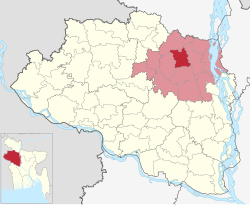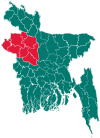Bogra Sadar Upazila
Bogra Sadar
বগুড়া সদর | |
|---|---|
 Gokul Medh, part of Mahasthangarh | |
 | |
| Coordinates: 24°51′N 89°22′E / 24.850°N 89.367°E | |
| Country | |
| Division | Rajshahi |
| District | Bogra |
| Seat | Bogra |
| Area | |
| • Total | 176.58 km2 (68.18 sq mi) |
| Population | |
| • Total | 657,790 |
| • Density | 3,700/km2 (9,600/sq mi) |
| Time zone | UTC+6 (BST) |
| Postal code | 5800[3] |
| Area code | 051[4] |
| Website | sadar |
Bogra Sadar Upazila (Bengali: বগুড়া সদর উপজেলা) is an upazila of Bogra District in the Division of Rajshahi, Bangladesh. Bogra Thana was established in 1821 and was converted into an upazila in 1983.[5][6] The upazila takes its name from the district and the Bengali word sadar (headquarters). It is the subdistrict where the district headquarters, Bogra town, is located.
Geography
[edit]Bogra Sadar Upazila has a total area of 176.58 square kilometres (68.18 sq mi).[1] It borders Shibganj Upazila to the north, Gabtali Upazila to the east, Shajahanpur Upazila to the south, and Kahaloo Upazila to the west. The Karatoya River flows south through the upazila.[6]
Demographics
[edit]| Year | Pop. (000) | ±% |
|---|---|---|
| 1981 | 454 | — |
| 1991 | 589 | +29.7% |
| 2001 | 694 | +17.8% |
| 2011 | 555 | −20.0% |
| 2022 | 658 | +18.6% |
| 2011 population declined because upazila boundaries were redrawn to create Shajahanpur Upazila Source: Bangladesh Bureau of Statistics[1] | ||
According to the 2011 Census of Bangladesh, Bogra Sadar Upazila had 131,862 households and a population of 555,014. 101,626 (18.31%) were under 10 years of age. Bogra Sadar had a literacy rate (age 7 and over) of 65.70%, compared to the national average of 51.8%, and a sex ratio of 927 females per 1000 males. 350,397 (63.13%) lived in urban areas.[1][8]
The boundaries of the upazila were redrawn in 2003 to create a new upazila, Shajahanpur.[6] The combined population of the two in 2011 was 844,818, a 21.7% increase from 2001.
Administration
[edit]Bogra Sadar Upazila is divided into Bogra Municipality and 11 union parishads: Erulia, Fapore, Gokul, Lahiri Para, Namuja, Nishindara, Noongola, Rajapur, Sekherkola, Shabgram, and Shakharia. The union parishads are subdivided into 92 mauzas and 122 villages.
Bogra Municipality is subdivided into 20 wards and 111 mahallas.[1]
Education
[edit]There are 13 colleges in the upazila, most located in Bogra town. Those outside the town include Adarsha Mohabiddyalaya in Puran Bogra, Jahidur Rahman Women's College in Erulia, Govt. Shah Sultan College, Namuza Degree College in Namuja, and Noon Gola Degree College.[9]
See also
[edit]References
[edit]- ^ a b c d e "Bangladesh Population and Housing Census 2011 Zila Report – Bogra" (PDF). bbs.gov.bd. Bangladesh Bureau of Statistics.
- ^ National Report (PDF). Population and Housing Census 2022. Vol. 1. Dhaka: Bangladesh Bureau of Statistics. November 2023. p. 401. ISBN 978-9844752016.
- ^ "Bangladesh Postal Code". Dhaka: Bangladesh Postal Department under the Department of Posts and Telecommunications of the Ministry of Posts, Telecommunications and Information Technology of the People's Republic of Bangladesh. 21 October 2024.
- ^ "Bangladesh Area Code". China: Chahaoba.com. 18 October 2024.
- ^ Haq, Md Nazmul (2012). "Bogra District". In Islam, Sirajul; Jamal, Ahmed A. (eds.). Banglapedia: National Encyclopedia of Bangladesh (Second ed.). Asiatic Society of Bangladesh.
- ^ a b c Jasimuddin, AKM (2012). "Shahjahanpur Upazila". In Islam, Sirajul; Jamal, Ahmed A. (eds.). Banglapedia: National Encyclopedia of Bangladesh (Second ed.). Asiatic Society of Bangladesh.
- ^ Population and Housing Census 2022 - District Report: Bogura (PDF). District Series. Dhaka: Bangladesh Bureau of Statistics. June 2024. ISBN 978-984-475-235-1.
- ^ "Community Tables: Bogra district" (PDF). bbs.gov.bd. Bangladesh Bureau of Statistics. 2011.
- ^ "List of Institutions". Ministry of Education. Retrieved July 15, 2014.
External links
[edit]- Official website (in Bengali)

